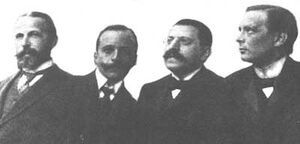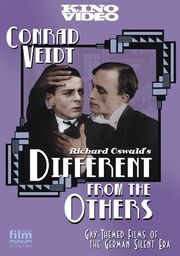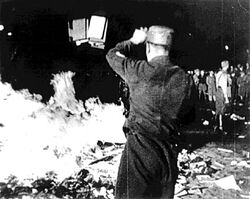Assessment |
Biopsychology |
Comparative |
Cognitive |
Developmental |
Language |
Individual differences |
Personality |
Philosophy |
Social |
Methods |
Statistics |
Clinical |
Educational |
Industrial |
Professional items |
World psychology |
Social psychology: Altruism · Attribution · Attitudes · Conformity · Discrimination · Groups · Interpersonal relations · Obedience · Prejudice · Norms · Perception · Index · Outline

Magnus Hirschfeld in 1933
Magnus Hirschfeld (Kolberg, May 14, 1868 - Nice, May 14, 1935) was a prominent German-Jewish physician, sexologist, and gay rights advocate.
Early contributions to sexology[]
Hirschfeld developed the theory of a third, "intermediate sex" between men and women. He was interested in the study of a wide variety of sexual and erotic urges, at a time when the early taxonomy of sexual identity labels was still being formed. His scientific work extended that of Karl Heinrich Ulrichs and influenced Havelock Ellis and Edward Carpenter.
Gay rights activism[]

The Scientific Humanitarian Committee board in 1901: left to right, Georg Plock, Dr Ernst Burchard, Dr Magnus Hirschfeld, and baron von Teschenberg.
As a young man he had lived in Paris and worked as a journalist. His subsequent career successfully found a balance between medicine and writing. After several years as a general practitioner in Magdeburg, in 1896 he issued the anonymous pamphlet Sappho and Socrates, on homosexual love. In 1897, Hirschfeld founded the Scientific Humanitarian Committee with Adolf Brand, Benedict Friedlaender and other leaders of Der Eigene, a homosexual campaign and publication. The group aimed to undertake research to defend the rights of homosexuals and to repeal Paragraph 175, the section of the German penal code that since 1871 had criminalized homosexuality. They argued that the law encouraged blackmail, and the motto of the Committee, "Justice through science", reflected Hirschfeld's belief that a better scientific understanding of homosexuality would eliminate hostility toward homosexuals. He was a tireless campaigner and became a well-known public figure.
Magnus Hirschfeld in 1900

DVD cover of Richard Oswald's 1919 film Different From the Others, Anders als die Andern
Within the group, some of the women, as well as Friedlaender, scorned Hirschfeld's analogy that homosexuals are like cripples. They argued that society might tolerate or pity cripples, but never treat them as equals. They also disagreed with Hirschfeld's (and Ulrichs's) view that male homosexuals were by nature womanish — Brand, Friedlaender and others would later leave the Scientific-Humanitarian Committee and form their another group, Gemeinschaft der Eigenen, which argued that male-male love is a simple aspect of virile manliness rather than a special condition.
However, the Scientific-Humanitarian Committee, under Hirschfeld's leadership, managed to gather over 5000 signatures from prominent Germans for a petition to overturn Paragraph 175. Signatories included Albert Einstein, Hermann Hesse, Thomas Mann, Rainer Maria Rilke and Leo Tolstoy, but no one admitted publicly to being homosexual themselves.
The bill was brought before the Reichstag in 1898, but was only supported by a minority from the Social Democratic Party of Germany, prompting a frustrated Hirschfeld to consider the controversial strategy of "outing" — that is, forcing some of the prominent law-makers who had remained silent out of the closet. The bill continued to come before parliament, and eventually began to make progress in the 1920s before the takeover of the Nazi party obliterated any hopes for reform.
In 1921 Hirschfeld organised the First Congress for Sexual Reform, which led to the formation of the World League for Sexual Reform. Congresses were held in Copenhagen (1928), London (1929), Vienna (1930), and Brno (1932).
Hirschfeld was both quoted and caricatured in the press as a vociferous expert on sexual manners, receiving the epithet "the Einstein of Sex". He saw himself as a campaigner and a scientist, investigating and cataloging many varieties of sexuality, not just homosexuality. He coined the word "transvestism," for example.
Anders als die Andern[]
Hirschfeld co-wrote and acted in the 1919 film Anders als die Andern ("Different From the Others"), where actor Conrad Veidt played possibly the first homosexual character ever written for cinema. The film had a specific gay-rights law reform agenda — Veidt's character is blackmailed by a lover, eventually coming out rather than continuing to make the blackmail payments, but his career is destroyed and he is driven to suicide.
Institut für Sexualwissenschaft[]
In 1919, under the more liberal atmosphere of the newly founded Weimar Republic, Hirschfeld was given a former royal palace for his new Institut für Sexualwissenschaft (Institute for Sexual Research) in Berlin. His Institute housed his immense library on sex and provided educational services and medical consultations. People from around Europe visited the Institute to gain a clearer understanding of their sexuality. Christopher Isherwood writes about his and Auden's visit to the Institute in his book Christopher and His Kind. They were visiting Francis Turville-Petre, a friend of Isherwood's who was staying there. The Institute also housed the Museum of Sex, an educational resource for the public which is reported to have been visited by school classes. The Institute and Hirschfeld's work there is depicted in Rosa von Praunheim's documentary film The Einstein of Sex (Germany, 2001 - English subtitled version available).
Feminism[]
In 1904, Hirschfeld joined the Bund fur Mutterschutz (League for the Protection of Mothers), the feminist organization founded by Helene Stöcker. He campaigned for the decriminalisation of abortion, and against policies that banned female teachers and civil servants from marrying or having children.
Criticisms[]
Hirschfeld's work continues to be controversial. Critics have claimed that some of his financial support came from closeted but prominent German homosexuals whom he blackmailed. Though he was immensely popular in some circles, in others he was reviled. Gatherings at which he spoke came under attack from anti-gay groups: in one such instance in 1921, his skull was fractured and he was left lying in the street.
Others complain that his belief that homosexuality was, at root, hormonal opened the door for others who were seeking a 'cure' for homosexuality. Yet the latest research in biology is now adding new credibility to his theories about the 'third sex' or 'intermediate sex'.
Nazi reaction[]

On May 10, 1933, Nazis in Berlin burned works of Jewish authors, and the library of the Institut für Sexualwissenschaft, and other works considered "un-German".
When the Nazis took power, one of their first actions, on May 6, 1933, was to destroy the Institut and burn the library. The press-library pictures & archival newsreel film of Nazi book-burnings seen today are usually pictures of Hirschfeld's library ablaze. Fortuitously, at that time Hirschfeld was away from Germany on a world speaking tour. He never returned to Germany, dying in exile in Nice of a heart attack on his 67th birthday in 1935. He is buried there.
Further reading[]
Works by Hirschfeld in English translation:
- Homosexuality of Men and Women; translated by Michael A. Lombardi-Nash. (Nash)
- The Transvestites: The Erotic Drive to Cross-Dress. (Prometheus Books)
- Men and Women: The World Journey of a Sexologist. (AMS Press, 1974)
- The Sexual History of the World War. (Cadillac Publishing Co., 1946)
Bibliography:
- Steakley, James D. The Writings of Magnus Hirschfeld: A Bibliography. (1985).
Biographical:
- Dose, Ralf Magnus Hirschfeld: Deutscher, Jude, Weltbürger. Teetz, Hentrich und Hentrich, 2005.
- Herzer, Manfred Magnus Hirschfeld: Leben und Werk eines jüdischen, schwulen und sozialistischen Sexologen. Second edition. Hamburg, MännerschwarmSkript-Verlag, 2001.
- Kotowski, Elke-Vera & Julius H. Schoeps (ed.) Der Sexualreformer Magnus Hirschfeld. Ein Leben im Spannungsfeld von Wissenschaft, Politik und Gesellschaft. Berlin, Bebra, 2004.
- Wolff, Charlotte. Magnus Hirschfeld: A Portrait of a Pioneer in Sexology. London, Quartet Books, 1986.
Further reading:
- Blasius, Mark & Phelan, Shane. (Eds.) We Are Everywhere: A Historical Source Book of Gay and Lesbian Politics. New York, Routledge, 1997. See chapter: The Emergence of a Gay and Lesbian Political Culture in Germany.
- Dynes, Wayne R. (ed.) Encyclopedia of Homosexuality. New York and London, Garland Publishing, 1990.
- Gordon, Mel Voluptuous Panic: The Erotic World of Weimar Berlin. Los Angeles, Feral House, 2000.
- Grantham, William An Oral History of Anal Sex. (2003).
- Grau, Günter (ed.) Hidden Holocaust? Gay and lesbian persecution in Germany 1933-45. New York, Routledge, 1995.
- Johansson, Warren & Percy, William A. Outing: Shattering the Conspiracy of Silence. New York, Harrington Park Press, 1994.
- Lauritsen, John and Thorstad, David. The Early Homosexual Rights Movement, 1864-1935. (Second Edition revised).
- Steakley, James D. The Early Homosexual Emancipation Movement in Germany. (1975).
See also[]
Magnus Hirschfeld, right, in old age with his partner, Li Shiu Tong (Tao Li)
- Harden-Eulenburg Affair, a major affair in Germany in 1907-1909 regarding accusations of homosexuality in high circles
- Magnus Hirschfeld Medal, awarded to outstanding sexologists by the German sexology society
- History of Gays during the Holocaust
- Arnold Aletrino- researcher and cofounder of the Dutch chapter of The Scientific Humanitarian Committee
External links[]
- Magnus Hirschfeld Archive of Sexology
- Magnus-Hirschfeld-Gesellschaft
- Online Exhibit on the Hirschfeld Institute
| This page uses Creative Commons Licensed content from Wikipedia (view authors). |